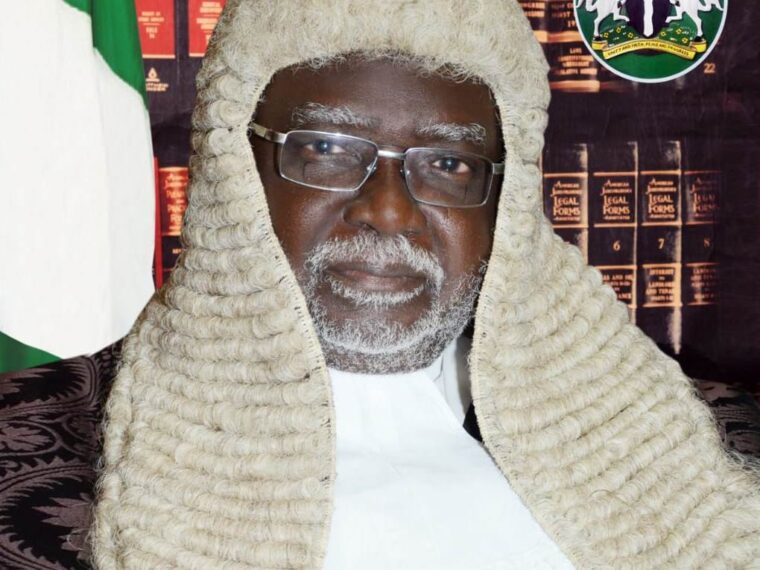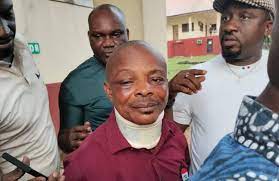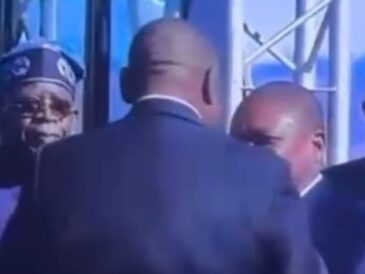*Pix above: CJN Ariwoola
PLEASE SHARE
An Abuja-based human rights and constitutional lawyer, Emmanuel Ekpenyong Esq., has sought the leave of the Court of Appeal, Abuja Division to appeal against its March 27 judgment which dismissed his appeal against the Federal Government, to the Supreme Court.
It would be recalled that the Court of Appeal had, on March 27, 2024, dismissed Ekpenyong’s appeal on the alleged prevalence of extra-judicial killings in the country and affirmed the decision of the trial court.
The appellate court upheld a Federal High Court (FHC) Abuja judgment delivered by Justice Nkeonye Maha, on May 6, 2022, that dismissed his suit seeking to address the increasing cases of extra-judicial killings by the law enforcement agencies and non-state actors in Nigeria.
The three-member Justices, chaired by Justice Joseph Oyewole, unanimously held that the appellant, Emmanuel Ekpenyong Esq. of the law firm of Fred-Young & Evans LP, lacked requisite locus standi (legal right) to institute the suit.
Justice Oyewole-led panel also awarded a N250, 000 costs against the lawyer.
However, in a Notice of Motion for Leave to Appeal marked: CA/ABJ/PRE/ROA/CU/582mi/2024 between Emmanuel Ekpenyong Esq. Vs. President, Federal Republic of Nigeria and Attorney-General and Minister of Justice of the Federation, the lawyer sought two orders.
The motion, dated and filed June 5, 2024, was made available to newsmen on Sunday in Abuja
The lawyer sought “an order granting leave to the applicant to appeal against the decision of the Court of Appeal, Abuja Division delivered on 27th March, 2024, in appeal no. CA/ABJ/CV/1200/2022, on grounds of mixed law and facts as set out in the proposed Notice of Appeal annexed as “Exhibit JO3” to this Notice of Motion”.
Also, he sought “an order granting leave to the applicant to appeal against the concurrent findings of the Federal High Court, Abuja Division in suit no. FHC/ABJ/CS/755/2020; and the judgment of the Court of Appeal, Abuja Division in appeal no. CA/ABJ/CV/1200/2022; on the extent of his right to life guaranteed under Section 33 (1) of the Constitution of the Federal Republic of Nigeria 1999 (as amended)”
On the first ground of appeal of the proposed notice of appeal accompanying the application for leave, Ekpenyong contended that the learned justices of the Court of Appeal misdirected themselves and erred in law when they held that reasonable cause of action vest Ekpenyong with the requisite locus standi to institute the suit and, treated Ekpenyong’s locus standi to institute the suit and his reasonable cause of action as the same legal concept and failed to consider the ratio in decided cases of superior courts on locus standi in fundamental human rights suits and constitutional matters.
On the second ground of appeal, Ekpenyong contended that “the Learned Justices of the Court of Appeal erred in law when they failed to consider the provisions of Article 3 (e) of the Fundamental Right Enforcement Procedure Rules, 2009 which confirms appellant’s locus standi in the suit but instead relied on the general principle of law on reasonable cause to arrive at the conclusion that the appellant has no locus standi to institute his fundamental human right suit”
On the third ground of appeal, Ekpenyong contended that the “Learned Justices of the Court of Appeal erred in law when they held that the appellant’s suit for interpretation of the extent of his constitutional right to life enshrined in Section 33 (1) of the Constitution of the Federal Republic of Nigeria, 1999 (as amended) does not disclose a reasonable cause of action and is mere academic and hypothetical”
He also argued that the court failed to consider the detailed wordings of Section 33 (1) and 46 (1) of the Constitution, the imports of the surviving paragraphs of his affidavit in support of the originating summons and the principle of law on burden of proof in fundamental human rights suits as provided in Section 46 (1) of the Constitution before reaching the decision that his suit did not disclose a reasonable cause of action and is merely academic and hypothetical.
He further contended that “the Learned Justices of the Court of Appeal did not consider any piece of evidence which the respondents placed before the Court to challenge the facts on unresolved extra judicial killings in Nigeria which puts the appellant in reasonable apprehension that his right to life is likely to be completely eroded or which challenged the weight, competence and admissibility of the exhibits tendered and admitted on the subject matter before they arrived at the decision that the appellant’s suit did not disclose a reasonable cause of action.
“The Court of Appeal did not state why the surviving paragraphs of the affidavit in support of the originating summons did not constitute a reasonable cause of action”
On the fourth ground of appeal, Ekpenyong contended that “the Learned Justices of the Court of Appeal erred in law when they affirmed the trial court’s award of N100, 000 costs against the appellant and awarded an additional costs of N250, 000 against the appellant, even where the trial court did not state its reason for the costs and no valid reason can be seen for the Court of Appeal to award additional costs against the appellant for prosecuting a suit for interpretation of his constitutional right to life enshrined in Section 33 (1) of the Constitution”
Against these backgrounds, Ekpenyong argued that “the findings of both the trial court and Court of Appeal is perverse and was reached as a result of a wrong approach to the evidence before them and a wrong application of principle of substantive law and procedure.”
He said there is a need for him to appeal their decision to the Supreme Court for the court to interfere with the findings of both courts.
“This constitutes an exceptional circumstance for this Honourable Court to grant this application,” Ekpenyong said.
He equally said that being dissatisfied with the judgment of the Court of Appeal, he is desirous of appealing against the concurrent findings in the judgment of both the lower and upper courts on questions of mixed law and facts.
The lawyer said the application is made in the interest of justice.
It would be recalled that Ekpenyong, a Nigerian citizen and legal practitioner, had appealed against a judgment delivered by Justice Maha of a FHC Abuja.
Justice Maha, who dismissed the suit, held that Ekpenyong failed to present sufficient facts in proof of the case.
The Judge, therefore, dismissed it for lack of reasonable cause of action against the defendants (President and AGF) and awarded a cost of N100, 000 against the plaintiff.
In the suit, Ekpenyong alleged that the wanton loss of human lives in Nigeria in recent times has put him as a “person” described under Section 33 (1) of the Nigerian Constitution in reasonable apprehension that his right to life under Section 33 (1), Chapter IV of the Nigerian Constitution is likely to be contravened.
In the Originating Summons marked: FHC/ABJ/CS/755/2020 dated and filed on July 10, 2020, the Appellant as Plaintiff submitted six questions for determination.
Ekpenyong urged the Court to determine amongst others whether his right to life enshrined in Section 33 (1) of Nigerian Constitution “means the protection of the plaintiff’s life beyond mere physical and animal existence and extends to the right to live a meaningful, complete and dignified life?
“Whether the plaintiff’s right to life enshrined in Section 33 (1) of the 1999 Constitution prohibits any unlawful acts of omission or commission by the Nigerian state, Nigerian police, other law enforcement agents andenforcement agents and private individuals which are capable of terminating the Plaintiff’s life?
He then sought an order of mandatory Injunction compelling the Defendants to take immediate steps to overhaul and reform the Nigerian police and other law enforcement agencies to incorporate forensic science in their criminal investigations to address extra-judicial killings by both state and non-state actors.
He said this would also help to ensure that every unlawful death committed are thoroughly investigated and the culprit arraigned before a Court of competent jurisdiction, among other reliefs./PLEASE SHARE





